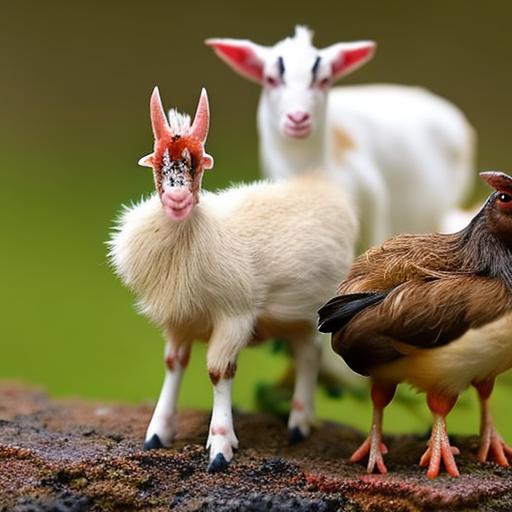Miniature goats and chickens have become increasingly popular as pets in recent years. These pint-sized animals offer a unique and charming addition to any backyard or small farm. Miniature goats, also known as pygmy or dwarf goats, are smaller versions of their larger counterparts and are known for their friendly and playful nature. Chickens, on the other hand, are known for their ability to provide fresh eggs and natural pest control. Many people choose to keep miniature goats and chickens together due to the mutual benefits they provide.
Key Takeaways
- Miniature goats and chickens can make great pets and companions.
- Keeping miniature goats and chickens together can provide benefits such as pest control and fertilizer production.
- Factors to consider before housing miniature goats and chickens together include space, zoning laws, and predator protection.
- A safe and comfortable living space for miniature goats and chickens should include shelter, fencing, and appropriate bedding.
- Feeding miniature goats and chickens requires some similarities, such as access to fresh water and a balanced diet, but also some differences, such as the need for specific minerals for goats.
The Benefits of Keeping Miniature Goats and Chickens Together
One of the main benefits of keeping miniature goats and chickens together is natural pest control. Chickens are excellent at foraging for insects, ticks, and other pests in the yard, while goats can help keep weeds and overgrown vegetation in check. By allowing these animals to roam together, you can reduce the need for chemical pesticides and herbicides in your yard.
Another benefit is companionship for both animals. Miniature goats are social creatures that thrive in the company of others, including humans and other animals. Chickens, although not as social as goats, can still provide some level of companionship for them. The presence of chickens can also help reduce stress and anxiety in goats, as they provide a sense of security and familiarity.
Furthermore, keeping miniature goats and chickens together can have mutual benefits for their health and well-being. Goats are known to be browsers, meaning they prefer to eat a variety of plants rather than just grass. By allowing them to share a space with chickens, they can benefit from the chickens’ scratching and pecking behavior, which helps expose new plant growth and encourages the goats to eat a wider range of vegetation.
Factors to Consider Before Housing Miniature Goats and Chickens Together
Before deciding to house miniature goats and chickens together, there are several factors to consider. First and foremost, space requirements must be taken into account. Both goats and chickens need ample space to roam and graze. Goats require at least 200 square feet per goat, while chickens need about 4 square feet per bird in the coop and 10 square feet per bird in the run.
Additionally, it is important to check zoning laws and regulations in your area. Some municipalities have restrictions on keeping livestock or poultry, so it is essential to ensure that you are in compliance with local regulations before bringing home miniature goats and chickens.
Lastly, compatibility of breeds should be considered. Some goat breeds may be more aggressive or territorial than others, which can pose a risk to chickens. It is important to choose goat breeds that are known to be gentle and docile, such as Nigerian Dwarf or Pygmy goats. Similarly, certain chicken breeds may be more prone to aggression or stress, so it is important to choose breeds that are known to be calm and friendly.
Creating a Safe and Comfortable Living Space for Miniature Goats and Chickens
When housing miniature goats and chickens together, it is important to create a safe and comfortable living space for both animals. Choosing the right housing materials is crucial to ensure their well-being. The coop should be sturdy and predator-proof, with solid walls and a secure roof. The flooring should be easy to clean and provide good drainage.
Adequate ventilation and lighting are also essential for the health of both goats and chickens. Proper airflow helps prevent the buildup of ammonia from manure, which can lead to respiratory issues. Natural light is beneficial for both animals’ well-being, so windows or skylights should be included in the design of the coop.
Furthermore, ensuring proper fencing and security measures is crucial to keep both goats and chickens safe from predators. Fencing should be tall enough to prevent goats from jumping over and small enough to prevent chickens from squeezing through. Electric fencing can also be used as an additional deterrent for predators.
Feeding Miniature Goats and Chickens: Similarities and Differences
Miniature goats and chickens have some similarities in their diet and nutritional needs, but there are also some differences to consider. Both animals require a balanced diet that includes a combination of forage, grains, and supplements.
Goats are browsers and prefer to eat a variety of plants, including grass, leaves, and shrubs. They also require access to fresh water at all times. In addition to forage, goats should be fed a small amount of grain or pelleted feed to ensure they receive all the necessary nutrients.
Chickens, on the other hand, are omnivores and require a diet that includes grains, seeds, fruits, vegetables, and insects. They also need access to grit, which helps them digest their food properly. In addition to their regular diet, chickens should be provided with calcium supplements to support egg production.
It is important to note that feeding schedules and portion sizes may differ between goats and chickens. Goats typically require two meals a day, while chickens can have free access to food throughout the day. Portion sizes should be adjusted based on the size and age of the animals.
Maintaining Cleanliness and Hygiene in a Shared Living Space

When housing miniature goats and chickens together, it is important to maintain cleanliness and hygiene in their living space. Regular cleaning and disinfecting of the coop and surrounding areas are essential to prevent the buildup of bacteria and parasites.
The coop should be cleaned at least once a week, with soiled bedding removed and replaced with fresh bedding. Disinfectants specifically designed for use in animal housing can be used to kill bacteria and parasites. It is important to follow the instructions on the disinfectant label and ensure that it is safe for use around both goats and chickens.
Proper waste management is also crucial to maintain cleanliness and hygiene. Manure should be removed from the coop and run regularly to prevent the buildup of ammonia and flies. Composting manure can be a beneficial way to recycle waste and create nutrient-rich soil for gardening.
Preventing the spread of disease is another important aspect of maintaining cleanliness and hygiene. Quarantining new animals before introducing them to the existing flock can help prevent the spread of diseases. Regular health checks and vaccinations are also essential to ensure the well-being of both goats and chickens.
Socialization and Interaction: Can Miniature Goats and Chickens Get Along?
Miniature goats and chickens can get along well if introduced properly and given time to adjust to each other’s presence. When introducing the animals, it is important to do so gradually and in a controlled environment. This can be done by placing the new animals in a separate enclosure within sight of each other for a few days before allowing direct contact.
Signs of aggression or stress should be closely monitored during the introduction process. Goats may display aggressive behavior towards chickens, such as head-butting or chasing. Chickens, on the other hand, may become stressed or fearful if they are constantly being chased or pecked by goats.
To encourage positive interactions between goats and chickens, it is important to provide plenty of space for both animals to roam and explore. Offering enrichment activities, such as toys or hanging treats, can also help keep them occupied and reduce any potential aggression or stress.
Potential Risks and Challenges of Keeping Miniature Goats and Chickens Together
While there are many benefits to keeping miniature goats and chickens together, there are also potential risks and challenges that should be considered. One of the main risks is predators. Both goats and chickens are vulnerable to attacks from predators such as dogs, coyotes, raccoons, and foxes. It is important to take appropriate measures to secure the coop and run to prevent these predators from gaining access.
Health risks and diseases are another concern when keeping miniature goats and chickens together. Goats can be susceptible to parasites such as worms and coccidia, while chickens can be prone to diseases such as avian influenza or Marek’s disease. Regular check-ups and preventative care, including vaccinations and deworming, are essential to keep both animals healthy.
Noise and odor complaints from neighbors can also be a challenge when keeping miniature goats and chickens together. Goats can be noisy animals, especially during breeding season or when they are in heat. Additionally, the smell of manure can be strong, especially if proper waste management practices are not followed. It is important to consider the proximity of neighbors and take steps to minimize any potential disturbances.
Health and Veterinary Care for Miniature Goats and Chickens
Regular health and veterinary care are essential for the well-being of miniature goats and chickens. Both animals should receive regular check-ups to ensure they are in good health. A veterinarian who specializes in small animals, including goats and chickens, should be consulted for any health concerns or questions.
Common health issues to watch for in miniature goats include parasites, respiratory infections, and hoof problems. Regular deworming, vaccinations, and hoof trimming should be part of their routine care. Additionally, goats should have access to a mineral supplement to ensure they receive all the necessary nutrients.
Chickens can also experience health issues such as respiratory infections, mites or lice infestations, and egg-laying problems. Regular health checks, vaccinations, and parasite prevention should be part of their routine care. Providing a clean and comfortable nesting area can help prevent egg-laying issues.
Is Keeping Miniature Goats and Chickens Together Right for You?
In conclusion, keeping miniature goats and chickens together can be a rewarding and enjoyable experience. The benefits of natural pest control, companionship, and mutual health benefits make them a popular choice for many pet owners. However, it is important to consider all factors before making a decision.
Factors such as space requirements, zoning laws, and breed compatibility should be carefully considered. Creating a safe and comfortable living space, providing proper nutrition, and maintaining cleanliness and hygiene are essential for the well-being of both animals. Socialization and interaction should be encouraged, but potential risks and challenges such as predators, health risks, and noise complaints should also be taken into account.
Ultimately, keeping miniature goats and chickens together can be a wonderful addition to any backyard or small farm. By doing further research and considering all factors, you can make an informed decision that is right for you and your pets.
If you’re considering keeping a miniature goat with your chickens, it’s important to understand the dynamics between these two animals. While goats and chickens can coexist peacefully, there are certain factors to consider. One crucial aspect is providing adequate space for both species. In fact, the size of your chicken coop door can play a significant role in ensuring the safety and well-being of your flock. To learn more about the ideal chicken coop door size and other essential considerations for keeping chickens, check out this informative article on Poultry Wizard: Chicken Coop Door Size: What You Need to Know. Additionally, if you’re looking for creative ideas to enhance your chicken coop’s interior, this article on Poultry Wizard offers some fantastic suggestions: Chicken Coop Interior Ideas: Creating a Comfortable Space for Your Flock.
FAQs
What is a miniature goat?
A miniature goat is a small breed of goat that is typically less than 2 feet tall at the shoulder and weighs between 50-100 pounds.
Can miniature goats and chickens live together?
Yes, miniature goats and chickens can live together as long as they are properly introduced and have enough space to coexist peacefully.
What are the benefits of keeping miniature goats and chickens together?
Keeping miniature goats and chickens together can provide a variety of benefits, including natural pest control, fertilizer production, and entertainment.
What are the potential challenges of keeping miniature goats and chickens together?
The potential challenges of keeping miniature goats and chickens together include the risk of injury to the chickens from the goats, the risk of the goats eating the chickens’ food, and the need for adequate space and shelter for both species.
What should I consider before keeping miniature goats and chickens together?
Before keeping miniature goats and chickens together, you should consider the space and shelter requirements for both species, the temperament of your goats and chickens, and any local regulations or zoning laws that may apply.
Meet Walter, the feathered-friend fanatic of Florida! Nestled in the sunshine state, Walter struts through life with his feathered companions, clucking his way to happiness. With a coop that’s fancier than a five-star hotel, he’s the Don Juan of the chicken world. When he’s not teaching his hens to do the cha-cha, you’ll find him in a heated debate with his prized rooster, Sir Clucks-a-Lot. Walter’s poultry passion is no yolk; he’s the sunny-side-up guy you never knew you needed in your flock of friends!







